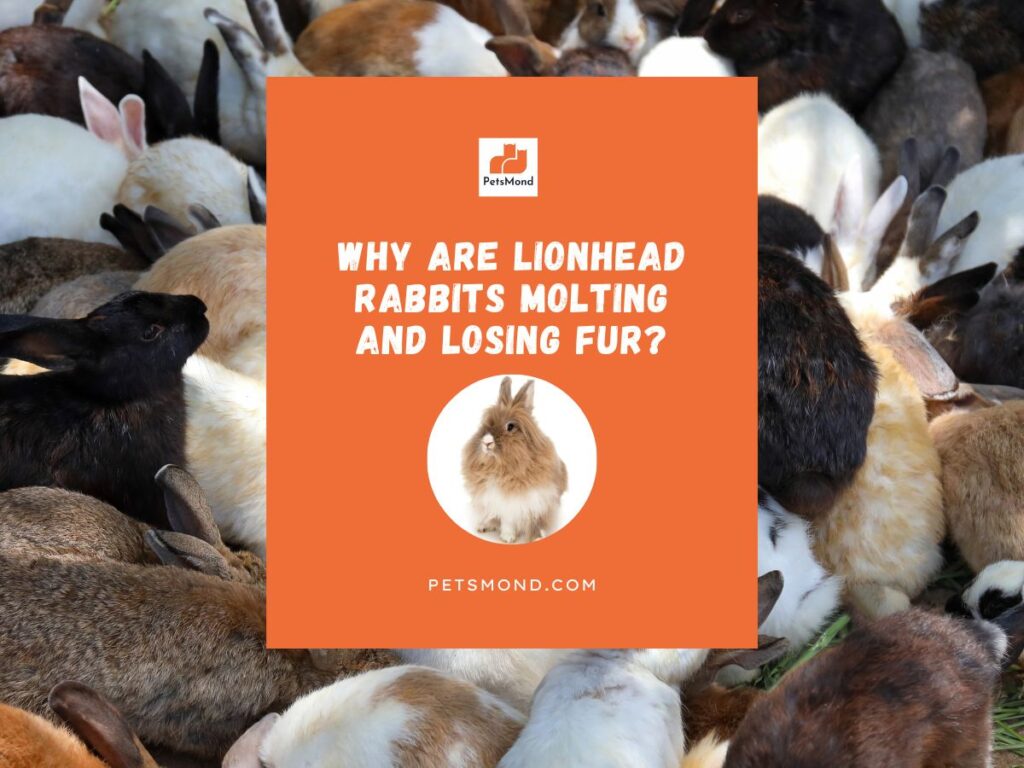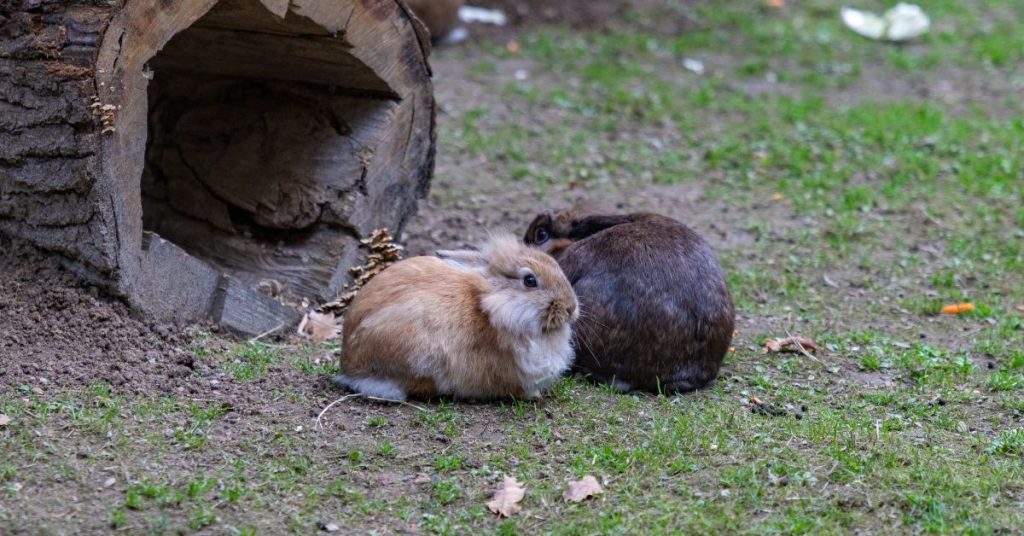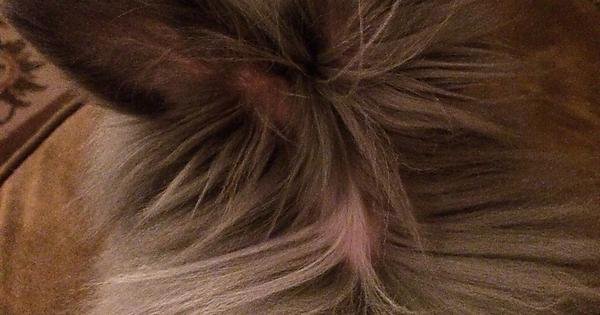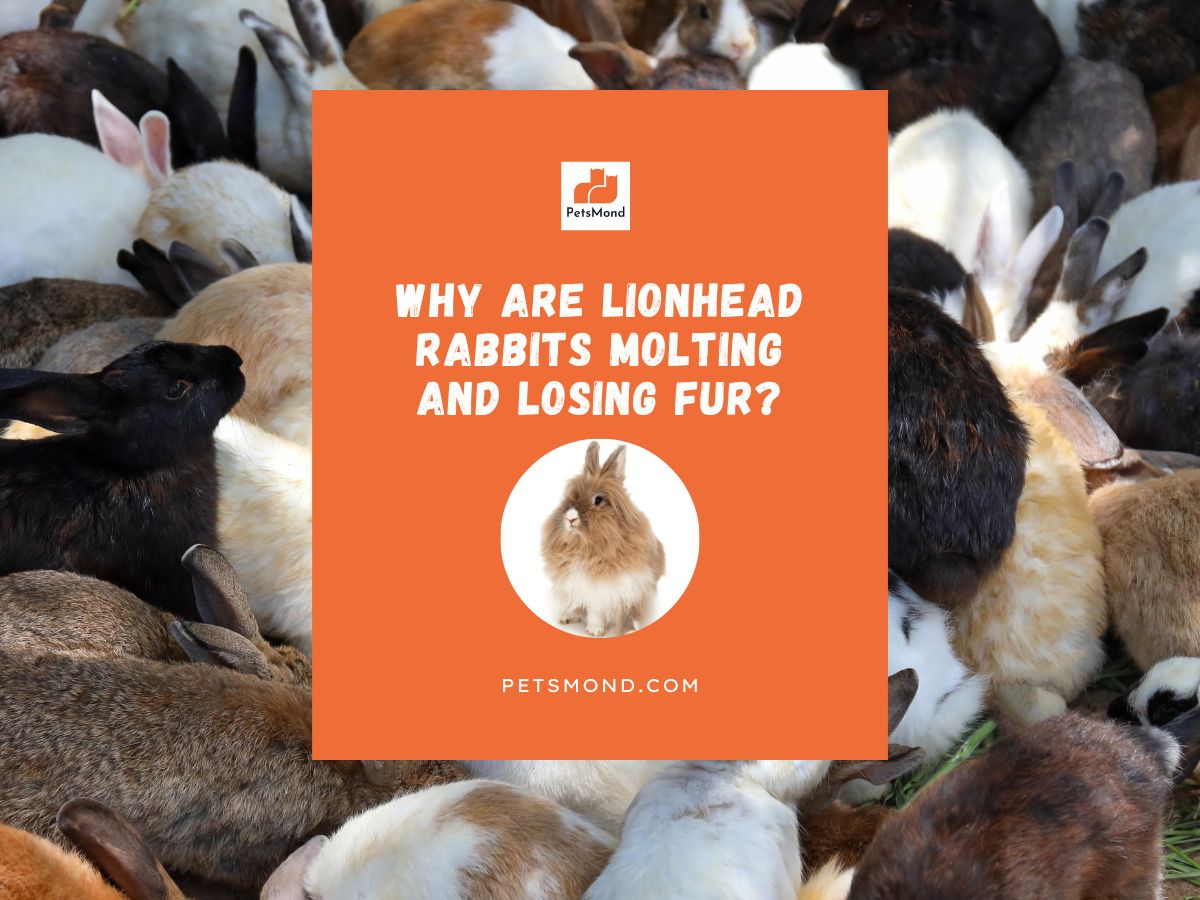During certain months of the year, my rabbits used to lose fur. I’ve noticed how my lionhead rabbit used to bite and spit fur all of a sudden. When it was the first time, I almost panicked and took him to a vet. That was when I was introduced to a concept called molting. If you’re new to raising lionhead rabbits and wondering why they’re molting and losing fur, here you go!
Lionhead rabbits molt and lose fur for one or more reasons – bacterial infection, stress, seasonal/hormonal change, poor nutrition, overgrooming, wet fur, pregnancy, abscess, injury, dental problem, and skin disease. While molting is common among them, it’s essential to feed a nutritious diet to them.
Honestly, taking care of your lionhead rabbit during the molting season is critical as the rabbit is easily prone to infections and deficiencies. Based on my experiences, I’ve created a detailed article addressing key sections:
- Reasons for lionhead rabbits to lose fur
- Molting and its consequence on lionhead rabbits
- Quick remedies to prevent fur loss in your lionhead rabbit

Reasons For Lionhead Rabbits To Lose Fur
It’s not uncommon for rabbits to lose fur. The University of Miami states that rabbits change their coat twice a year. It’s just sufficient to know that it’s common. But, what’s uncommon is the associated cause and the season of the year.
If your lionhead rabbit is losing fur at the wrong season of the year, that’s a red flag!
From my experience in raising a lot of rabbits from different breeds, I’ve formulated the top 12 reasons for lionhead rabbits lose fur.
Bacterial Infection
Bacterial infections can cause a lionhead rabbit to lose fur. This type of infection is generally caused by bacteria growing in the skin or hair follicles, resulting in inflammation and irritation. A vet will be able to determine if your rabbit has a bacterial infection and prescribe an appropriate antibiotic to treat it.
Poor Nutrition
Poor nutrition can also contribute to a lionhead rabbit molting and losing fur. A diet that lacks the essential vitamins and minerals needed for healthy skin and coat can result in dry, brittle fur that may eventually fall out in clumps. It is important to provide your rabbit with a balanced diet consisting of fresh vegetables, fruits, hay, and commercial rabbit pellets for optimal health.
Stress
Stress is another factor that can lead to lionhead rabbits losing fur. Rabbits are easily stressed animals, so any major changes, such as relocation or introduction of new pets, can cause them to molt. It is important to create a quiet, stress-free environment for the rabbit and monitor their behavior closely during times of transition.
Seasonal Changes
Like humans, lionhead rabbits tend to molt more during certain seasons due to changes in temperature or climate conditions. During colder months, they may grow a thicker coat while shedding excessive hair in warmer months when temperatures rise. If you notice your bunny losing fur excessively during certain times of the year, it could be due to seasonal changes.
Hormonal Change
Hormonal changes may also cause a lionhead rabbit’s fur to thin out significantly or fall out altogether as hormones fluctuate throughout their life cycle. Female rabbits usually go through hormonal shifts during mating season when they are most fertile; however, both male and female rabbits can experience hormone changes at other stages of life as well.
Wet Fur
Keeping your lionhead rabbit’s fur dry is key in preventing them from molting excessively or losing too much hair at once. Wet fur encourages the growth of bacteria which can lead to irritation and shedding of their coat; make sure their bedding stays dry and check if they need grooming after swimming sessions or baths!
If you’re new to grooming your rabbit, here’s a video that can help you:
Abscess
An abscess on your lionhead rabbit’s body could be another reason why they are losing their fur, as it causes pain and discomfort that may lead them to overgroom themselves in an attempt at relieving some of the soreness associated with it; this could further aggravate the problem if not addressed properly by seeking medical attention from a vet immediately.
Overgrooming
Overgrooming can cause severe damage to a lionhead rabbit’s coat if not done carefully; some rabbits have been known to bite off large chunks of their own fur due to boredom or anxiety, which could result in bald patches across their bodies quickly if left unchecked.
Pregnancy
Pregnancy causes hormonal imbalances that often result in excessive molting of fur—this is especially true for female rabbits who typically shed more than males on account of having larger litter—so keep an eye out for signs like abdominal swelling, among other physical changes.
Injury
Injuries inflicted upon a lionhead rabbit’s body could also cause them considerable discomfort leading them to overgroom themselves excessively; this includes bites from predators outside as well as accidents inside where they could catch onto sharp objects like furniture edges.
Skin Disease
Different types of skin diseases, such as mites, fungal infections, eczema, etc., are some common reasons why your furry friend might start shedding thick clumps of hair all year round—it is important that you take it seriously enough by getting him/her checked out by a vet regularly.
Dental Problem
Dental problems like improper alignment between teeth or worn down teeth due to age also contribute to creating an imbalance between intake/digestion & nutrient cycles affecting the quality & volume of their coat directly.
Do Lionhead Rabbits Molt?
Lionhead rabbits molt twice a year – March or April and October or November. This is when they shed old fur and grow new fur. However, the molting process also depends on factors like diet, stress, age, hormonal/seasonal changes, and other health conditions.
In this period, a bald patch is quite common, and it can be addressed in due course as they grow new fur. However, when it lasts longer, it’s essential to supplement with foods that can help them grow their skin.
How Often Do Lionhead Rabbits Molt?
Lionhead rabbits typically molt twice a year during seasonal changes such as winter and summer. Depending on the climate where they live, your rabbit may begin to molt at different times of the year. During molting periods, you may notice patches of fur missing or excessive shedding of fur.
Molting is a natural process for rabbits, although there are certain factors (such as stress or improper nutrition) that could cause it to occur more frequently.
Here’s an incredible video that offers handy tips to help your rabbit survive during the molting season:
How To Treat A Molting Lionhead Rabbit?
Treating a molting rabbit is easier with solutions like regular grooming, a nutritious diet, adequate space, better living conditions, and regular health checkups.
For treating a molting lionhead rabbit, regular grooming is essential. This includes brushing the fur and checking for parasites or skin infections, as well as trimming the nails to prevent them from becoming too long.
Additionally, using a comb to detangle any matted fur will help keep your rabbit healthy and looking at best.
A nutritious diet is also important, with regular feedings of hay, fresh vegetables, and other treats approved for rabbits. It’s also important to make sure your rabbit has access to clean water at all times. An unbalanced diet not only affects molting but can lead to further health problems in the future.
Adequate space is also necessary for a healthy environment for your rabbit. This means having enough room to move around and explore without being cramped or feeling stressed out.

Rabbit-proofing your home by blocking off areas with wires or other materials that are impossible for your rabbit to chew through will also help prevent any potential accidents or escapes.
Better living conditions are key when it comes to helping treat a molting lionhead rabbit. This includes providing adequate ventilation and temperature control in their living space so it can stay comfortable and healthy during the molting season when temperatures can become extreme both inside and outside the home.
I let my lionhead rabbit free-roam at home and stay cautious when he enters the grassland. This enhanced living condition has certainly contributed to his longevity.
Regular health checkups should be done by an experienced veterinarian specializing in exotic pets like rabbits. This allows vets to monitor how the molt is progressing and provide advice on how best to manage it while keeping your pet safe during this time of transition.
Above all, don’t forget to spend your time with lionhead rabbits. Otherwise, they can turn stressed and develop new health issues. Remember that they love to be cuddled and can seek your attention through different ways like biting you, following you, peeing on your bed, and whatnot.
FAQ
Why Is My Rabbit Losing Fur Around His Eyes?
Some possible reasons for lionhead rabbits to lose fur around the eyes include poor nutrition or diet, parasites or mites, allergies, and stress or anxiety. Excessive rubbing from furniture or other objects in their environment can also cause bald patches around the eyes.
It’s also highly recommended to offer nutritious food and lower stress levels with better environmental conditions.
Why Does My Rabbit Have A Bald Spot On His Neck?
Mites, parasites, poor nutrition or diet, and allergies can all cause bald patches to form on the skin of lionhead rabbits around the neck. Stress and anxiety can also lead to balding, as can excessive rubbing from furniture or other objects in their environment.

If you think that the fur loss is due to an underlying medical condition, it is important to take your rabbit to the vet for a check-up.
Why Is My Lionhead Rabbit Shedding So Much?
Excessive shedding in lionhead rabbits can be caused due to poor diet, parasites, allergies, anxiety, and stress. Sometimes, rabbit grooming products can also increase shedding rates and affect the overall appearance of the fur.
It’s essential to address this condition immediately by determining the underlying cause.
Why Is My Lionhead Rabbit Losing Its Mane?
A lionhead rabbit’s mane can start to thin or fall out due to poor nutrition, stress, parasitic infection, and other underlying medical condition. Supplementing the diet with a healthy living condition helps in faster recovery.
Related Articles


